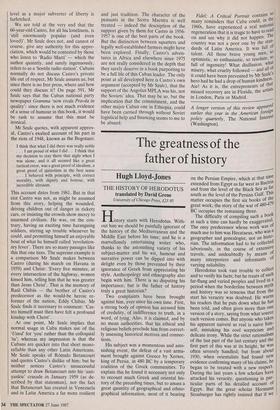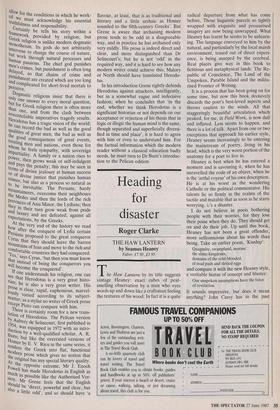The greatness of the father of history
Hugh Lloyd-Jones
THE HISTORY OF HERODOTUS translated by David Grene
University of Chicago Press, £23.95
History starts with Herodotus. With- out him we should be painfully ignorant of the history of the Mediterranean and the Middle East before his time; and he is a marvellously entertaining writer who, thanks to the astonishing variety of his subject-matter and his wit, humour and narrative power can be dipped into with delight even by those prevented by their ignorance of Greek from appreciating his style. Anthropology and ethnography also begin with him. There is no disputing his importance; but is the father of history truly a great historian?
Two complaints have been brought against him, ever since his own time. First, a strong body of opinion has accused him of credulity, of indifference to truth, in a word, of lying. Also, it is claimed, and by no mean authorities, that his ethical and religious beliefs preclude him from correct- ly assessing historical motives and connec- tions.
His subject was a momentous and asto- nishing event, the defeat of a vast arma- ment brought against Greece by Xerxes, king of Persia, in 480 BC by a temporary coalition of the Greek communities. To explain this he found it necessary not only to recount much Greek and oriental his- tory of the preceding times, but to amass a great quantity of geographical and ethno- graphical information, most of it bearing on the Persian Empire, which at that time extended from Egypt as far west as Bactria and from the level of the Black Sea as far south as the level of the Persian Gulf. This matter occupies the first six books of the great work; the story of the war of 480-479 BC occupies the remaining three. The difficulty of compiling such a book at such a time can hardly be exaggerated- The only predecessor whose work was of much use to him was Hecataeus, who was a geographer and genealogist, not an histo- rian. The information had to be collected laboriously, in the course of extensive travels, and undoubtedly by means of many interpreters and informants of varying reliability. Herodotus took vast trouble to collect and to verify his facts; but he treats of such far-flung and varied peoples and lived in a period when the borderline between myth and history was so tenuous that from the start his veracity was doubted. He warns his readers that he puts down what he has been told, and often gives more than one version of a story, saying from what source each version comes. But anyone who takes his apparent naiveté as real is naive him- self, mistaking his cool scepticism and delicate irony. While the strict rationalism of the last part of the last century and the first part of this was at its height, he was often severely handled; but from about 1930, when orientalists had found new evidence confirming many of his claims, he began to be treated with a new respect. During the last years a few scholars have attacked his veracity, questioning in par- ticular parts of his detailed account of Egypt. But the great scholar Hermann Strasburger has rightly insisted that if we allow for the conditions in which he work- ed we must acknowledge his essential truthfulness and responsibility. Certainly he tells his story within a framework provided by religion; but Greek religion is unlike modern dogmatic Monotheism. Its gods do not arbitrarily intervene to change the course of nature, but work through natural processes and human Passions. The chief god punishes Men's crimes, but punishment is often long delayed so that chains of crime and Punishment are created which are too long and complicated for short-lived mortals to Perceive.
Dogmatic religions insist that there is Only one answer to every moral question, but for Greek religion there is often more than one, and from the clash between Irreconcilable imperatives tragedy results. Herodotus has a tragic vision of the world; he can record the bad as well as the good qualities the of great men, the bad as well as good consequences of great events, treating men and nations, even those for whom he feels sympathy, with sovereign tmPartiality. A family or a nation rises to Power, then grows weak or self-indulgent and pays the penalty;. this may be seen in terms of divine jealousy at human success or of divine justice that punishes human climes, but also as a process so natural as to be inevitable. The Persians, hardy mountaineers overcome their neighbours the Medes and then the lords of the rich Provinces of Asia Minor, the Lydians; then they in their turn grow weak from pride and luxury and are defeated, against all expectations, by the Greeks. At the very end of the history we read lirw. after the conquest of Lydia certain Cyrus proposed to the great conqueror 'Yrus that they should leave the barren mountains of Iran and move to the rich and c, MnIortable countries they had conquered. Yes,' says Cyrus, tut then you must know that instead of being the conquerors you will become the conquered'. If one understands his religion, one can se. e that Herodotus is a very great histo- rian; he is also a very great writer. His Prose is clear, rapid, euphonious, marvel- lously varied according to its subject- matter; as a stylist no writer of Greek prose except Plato can compare with him. There is certainly room for a new trans- lation of Herodotus. The Pelican version by Aubrey de Selincourt, first published in 1954, was equipped in 1972 with an intro- duction by a well-qualified scholar, A. R. Homer but like the overrated versions of rlomer by E. V. Rieu in the same series, it renders the Greek into flat, functional modern prose which gives no notion that the original has any special literary quality. Powhe opposite extreme, Mr J. Enoch ell has made Herodotus in English as Much as possible like the Authorised Ver- sion, Mr Grene feels that the English almild be 'direct, powerful and clear, but se a little odd', and so should have 'a flavour, at least, that is as traditional and literary and a little archaic as Homer sounded to the fifth-century Greeks'. But Grene is aware that archaising modern prose tends to be odd in a disagreeable way, and in practice he has archaised only very mildly. His prose is indeed direct and clear, and more distinguished than Dr Selincourt's; but he is not 'odd' in the required way, and it is hard to see how any modern writer could achieve this; Malory or North should have translated Herodo- tus.
In his introduction Grene rightly defends Herodotus against attackers, intelligently, but in a somewhat vague and indecisive fashion; when he concludes that 'in the end, whether we think Herodotus is a significant historian or not depends on our acceptance or rejection of his thesis that in logic or illogic the human mind is the same, though separated and superficially diversi- fied in time and place', it is hard to agree with him or even to understand him. For the factual information which the modern reader without a classical education badly needs, he must turn to Dr Burn's introduc- tion to the Pelican edition.










































































 Previous page
Previous page